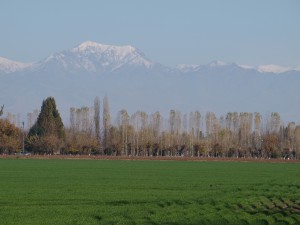15th November 2012 Tashkent, Uzbekistan
Climate
Last week I went to see the people in the Ministry of Foreign Affairs who are preparing for a high-level climate change meeting in Doha (in Qatar) at the end of this month – the 18th Conference of Parties of the UN Framework Convention on Climate Change. I went to explain the UK’s approach to the meeting, and what we believe it needs to achieve, and to hear about the Uzbek Government’s views.
 For me, climate change and how the international community responds to the challenges it raises is the most important single question on the international agenda: because the action we take, or fail to take, now will have an impact on all future generations to come, and because, even beyond the impact on agriculture and on “extreme weather events” – heatwaves, hurricanes, floods and so on – the damage done by climate change to the richness of life on earth will be irreversible.
For me, climate change and how the international community responds to the challenges it raises is the most important single question on the international agenda: because the action we take, or fail to take, now will have an impact on all future generations to come, and because, even beyond the impact on agriculture and on “extreme weather events” – heatwaves, hurricanes, floods and so on – the damage done by climate change to the richness of life on earth will be irreversible.
In my children’s lifetime, unless as a world we take urgent action, the global average temperature is likely to rise by more than the difference between the present level and the temperature at the time of the last ice age, when most of northern Europe was under a permanent cover of ice.
Climate change is an issue that more than any other needs to be addressed by the international community as a whole. It doesn’t matter where greenhouse gas emissions come from; they still have the same effect. Most other environmental issues are relatively local and can be resolved within a country or within a region, but climate change is different. All of us contribute to the problem, and all of us need to be part of the solution.
In an earlier job, I visited most of the capitals of African countries where Britain has Embassies, to talk to their governments about climate issues. The biggest lesson I draw from that was how important it is that climate be mainstreamed into wider policy making: it’s not something that’s just an environmental issue, or that can be dealt with in isolation from economic policy or agricultural policy, for example.
In Britain we’ve been working over the last few years to make sure that there is consistency across government policy making, and that over-arching objectives in relation to climate change – both to reduce our greenhouse gas emissions and to adapt to the impacts of climate change that are already inevitable.
Addressing climate change also offers opportunities: for new industries related to energy efficiency and renewable energy, and more generally for the development of a cleaner, greener economy. Especially in relation to energy and water use, this is an area where there’s a lot of interesting work going on in Uzbekistan, including projects under the Clean Development mechanism involving British companies.
I hope over my time here to find new ways we can work together, including in shaping the international agreements that are going to be under discussion at Doha.
Chevening Scholarships
I mentioned in an earlier post how impressed I’d been by the alumni of the Chevening Scholarship Scheme I met during Peter Lilley’s visit to Tashkent.
We’re now accepting applications for this year’s scholarship scheme, for study in the academic year 2013-14. If you’re a future leader who could benefit from a year’s post-graduate study in the UK, please have a look at the details of the scheme and consider applying (http://www.chevening.org/uzbekistan).